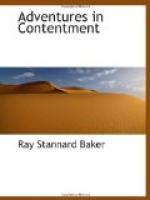The more he ate the more of a man he became. His manners improved, his back straightened up, he acquired a not unimpressive poise of the head. Such is the miraculous power of hot muffins and pie!
“As you came down,” I asked finally, “did you happen to see old man Masterson’s threshing machine?”
“A big red one, with a yellow blow-off?”
“That’s the one,” I said.
“Well, it was just turning into a field about two miles above here,” he replied.
“Big gray, banked barn?” I asked.
“Yes, and a little unpainted house,” said our friend.
“That’s Parsons’,” put in Harriet, with a mellow laugh. “I wonder if he ever will paint that house. He builds bigger barns every year and doesn’t touch the house. Poor Mrs. Parsons——”
And so we talked of barns and threshing machines in the way we farmers love to do and I lured our friend slowly into talking about himself. At first he was non-committal enough and what he said seemed curiously made to order; he used certain set phrases with which to explain simply what was not easy to explain—a device not uncommon to all of us. I was fearful of not getting within this outward armouring, but gradually as we talked and Harriet poured him a third cup of hot coffee he dropped into a more familiar tone. He told with some sprightliness of having seen threshings in Mexico, how the grain was beaten out with flails in the patios, and afterwards thrown up in the wind to winnow out.
“You must have seen a good deal of life,” remarked Harriet sympathetically.
At this remark I saw one of our Ruin’s long hands draw up and clinch. He turned his head toward Harriet. His face was partly in the shadow, but there was something striking and strange in the way he looked at her, and a deepness in his voice when he spoke:
“Too much! I’ve seen too much of life.” He threw out one arm and brought it back with a shudder.
“You see what it has left me,” he said, “I am an example of too much life.”
In response to Harriet’s melting compassion he had spoken with unfathomable bitterness. Suddenly he leaned forward toward me with a piercing gaze as though he would look into my soul. His face had changed completely; from the loose and vacant mask of the early evening it had taken on the utmost tensity of emotion.
“You do not know,” he said, “what it is to live too much—and to be afraid.”
“Live too much?” I asked.
“Yes, live too much, that is what I do—and I am afraid.”
He paused a moment and then broke out in a higher key:
“You think I am a tramp. Yes—you do. I know—a worthless fellow, lying, begging, stealing when he can’t beg. You have taken me in and fed me. You have said the first kind words I have heard, it seems to me, in years. I don’t know who you are. I shall never see you again.”
I cannot well describe the intensity of the passion with which he spoke, his face shaking with emotion, his hands trembling.




